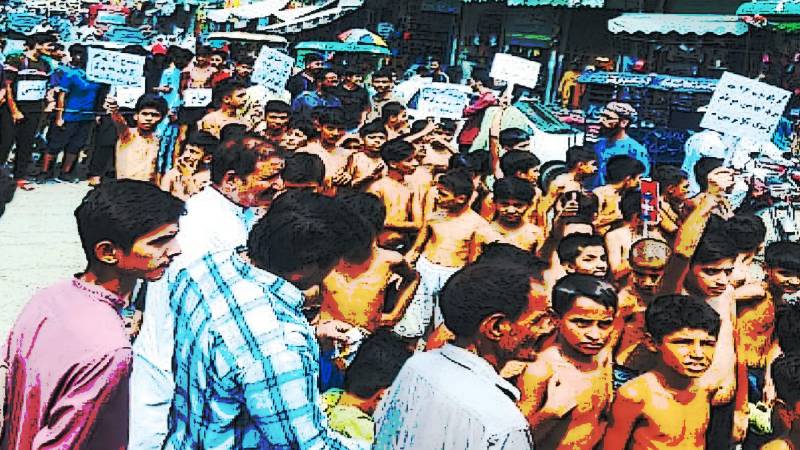
The picture of dozens of shirtless boys of school age protesting against high rates of electricity in Hafizabad, Punjab, must mark the beginning of great change. These young boys, their chests and ribs showing, carried homemade placards. Their glum expression said much – that if the government doesn't start paying attention to the easy flow of essential utilities, there may not be a promising future for the next generation.
The newspaper Dawn carried this photo of scores of boys marching on the streets on August 27. It reported they "burnt power bills and shouted slogans against the government".
There is something deeply unpleasant about the picture of children of school-going age protesting on the streets for affordable electricity. It shows that in the topsy-turvy state of our country, children are now the adults – and adults are children.
In the power corridors, our age-old leaders stamp their feet and slam the doors behind them. They scream and shout, pound their fists on the tables, and throw tantrums – to prove their way is the only right way. The harsh truth to face is that kids appear more mature and invested in their future when men and women of vintage variety act like spoilt brats.
Why must we see children participate in street protests, pelt stones at others, and run helter-skelter in the heavy cloud of tear gas?
It is natural that children, as part of this troubled society, will get drawn into politics
There's, after all, an age for everything. Must they not be in school? Must they be in an unsafe situation, at risk of being hurt? What kind of impact could it have on their innocent minds and their mental health? Does it teach them how to express dissent in a society?
Undeniably, children become a part of our political framework from the moment they can hear, see and sense. Even more, if they are born in marginalised households. When churches around their playgrounds get burned, suicide bombers blow themselves up in their cities; friends are molested and raped, and other friends are forced into child labour and subjected to physical and sexual harassment. It is natural that children, as part of this troubled society, will get drawn into politics.
It can be an empowering experience for children to come together with their communities to raise concerns that are relevant to their lived experiences
Children have often been a part of protests and rallies in Pakistan. Hundreds of children protested in Gwadar, holding placards and banners inscribed with "Gwadar ko haq do" in Nov 2021. The protest was against the unnecessary fishing trawlers and checkpoints in Gwadar.
Hundreds of children carried lunch boxes in Azad Jammu and Kashmir imprinted with "ban pellet guns at a global level and declare it a lethal weapon" in September 2016 to show solidarity with victims of pellet guns in Indian Kashmir.
Asha Bedar, a clinical psychologist with training in child abuse and trauma, says there is value in children's participation in public protest. "It can be an empowering experience for children to come together with their communities to raise concerns that are relevant to their lived experiences, to witness the power of the people, to feel that their voices matter or even to learn about issues around them, perhaps of those less privileged, even if they are not directly affected."
The case of thousands of schoolchildren walking out of classrooms into the street to join the climate strike in the UK in 2019 supports her point. Their courage added new dimensions to the momentum for faster action on climate change. It was believed that protesting is one of the few ways in which they could be part of a participatory democracy.
But, Bedar points out, there's a big difference between using children during protests and their participation or attendance. "Using them to garner sympathy for a cause can be exploitative because the child's understanding of the issue at hand, of potential consequences, and therefore their consent, are compromised. There is no benefit for them here."
So, when children tell us that we adults are burning their future, as they showed in Hafizabad, we must listen to them. Their picture must trigger a government reaction faster than expected. It must make a difference in the debate about the economic crisis in the country.

